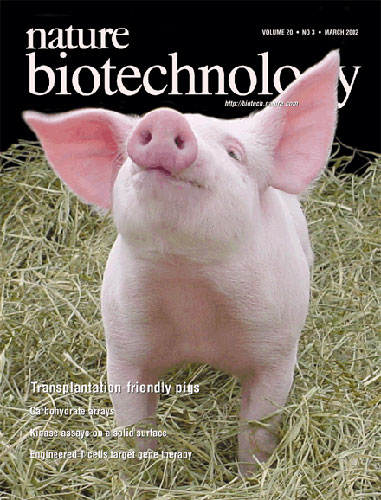Society
GM piglets bring hope in organ transplant
By Cheng Yingqi (China Daily)
Updated: 2011-03-23 07:10
 |
Large Medium Small |
|
 The photo on the cover of Nature Biotechnology, a scientific magazine, shows a GM pig bred by Professor Dai Yifan in the United States in 2002. [Provided to China Daily] |
BEIJING - Chinese scientists hope the country's first group of genetically modified (GM) cloned piglets will have organs that are suitable to be transplanted into humans.
|
||||
"The genetically modified piglets could bring hope to people who are in need of organ transplants but have failed to find a donor," said Zhao Zijian, head of the Metabolic Disease Research Center at Nanjing Medical University.
Zhao's research group has been studying GM technology since 1998 in the hope of replacing the gene in pigs that causes humans to reject transplanted pig organs, the Nanjing-based Yangtze Evening Post quoted Zhao as saying on Monday.
"Just as people with different blood types cannot accept blood transfusions from one another, pig organs were rejected by all human recipients before I replaced a certain sugar molecule with a human gene," said Dai Yifan, deputy director of the research center.
Dai successfully bred the so-called transplantation-friendly GM pigs in a laboratory at Revivicor Inc in the United States and took cells back to China earlier this year from which he plans to clone thousands of pigs.
The first brood will be born in five or six months in Nanjing, capital of Jiangsu province. They will then undergo additional experiments to see if they are suitable donors of hearts, kidneys and livers.
The scientists are currently constructing sterile pigsties that are "as clean as an operating room", Dai said. "The sterile environment will mean there are no viruses on the pigs that could cause diseases among humans."
However, transplant surgeons expressed doubts about the project.
"We know little about the viruses carried by pigs, so transplanting a pig organ into a human could add to the risk of animal epidemic diseases infecting humans," said Lu Shichun, a liver transplant expert at Beijing YouAn Hospital.
Organs from GM pigs have been used in tests in the United States since 2002 where they have sustained the lives of monkeys for up to 400 days. Such temporary transplants could potentially help keep human patients alive while waiting for human transplant organs.
Scientists from the Chinese Academy of Agricultural Sciences first bred GM pigs in November 2010. Clinical trials on humans have not been carried out anywhere in the world.
Because of a shortage of organs, only 10,000 out of 1 million people with kidney disease and 300,000 with liver disease awaiting a transplant are saved each year, Huang Jiefu, vice-minister of health, revealed earlier.
The research group will apply for permission to conduct clinical experiments after the piglets grow, said Dai.
Scientists said it is not known whether the government will allow experiments on transplanting pig organs into humans.
| 分享按钮 |



